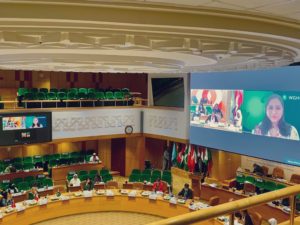Remarks by our Executive Director at the 69th WHO Regional Committee for the Eastern Mediterranean Region
12 October 2022
Panel Discussion On Leveraging Partnerships For Collective And Transformative Action To Achieve Health For All By All
This is the first time Women in Global Health delivers remarks the EMRO region since being in official relations with WHO. Dr Roopa Dhatt represented the Movement with the following remarks:

Thank you for inviting me to be part of this EMRO Regional Committee Meeting. My name is Dr Roopa Dhatt, I am the Executive Director of Women in Global health and one of its four founders.
I have been invited to speak about working in partnership with WHO to leverage health for all. Let me start with some background on our global movement.
In 2015 I was one of four early career women in the health sector who met on social media asking why there were so many expert women in global health but so few in global health leadership. We met at the World Health Assembly in 2015 and counted the number of women heading country delegations to be sure of our facts. We have recently calculated that since the start of the WHO in 1948 only 8% of country delegations to the World Health Assembly have had an equal number of women and men. Yet women are half the world’s population and 70% of the health workforce. Health systems would collapse without the work of women and decisions are better informed when the talent and expertise of women is included equally.
Ours is a simple message – this has to change – and I am particularly pleased to be speaking to EMRO because your region often lags behind other WHO regions on gender equality – there is scope for strong collaboration and a great deal we can achieve together.
Women in Global Health has grown very rapidly in our first seven years and this has been a landmark year despite the pandemic. We were delighted in January when the WHO Executive Board announced we had been accepted as a Non State Actor in special relations with WHO. And two weeks ago, women from over 50 countries, representing 41 national WGH chapters, met in Nairobi at the first ever face to face meeting of our virtual global network. I am delighted that three national chapters from the EMRO region – Somalia, Pakistan and Egypt – were with us at that meeting.
So let me give you three reasons why we were pleased to be accepted into special relations with WHO:
First, we respect the role of WHO and its inspirational mandate, rooted in human rights principles. We believe that a strong and well-funded WHO is essential to global health security. As a not for profit global network we stand to benefit from a strong WHO, including its regional offices, setting standards and driving global priorities such as Universal Health Coverage that are the world’s best chance of achieving Health for All. It is an essential part of our mission to support WHO with technical advice and knowledge grounded in the expertise of the women in our movement.
Second, Women in Global Health is a small, virtual organisation but with a global vantage point. We have no office and minimal funding so have always relied on working with others – governments, UN agencies and likeminded international NGOs – to leverage our respective strengths and magnify our messages. As governments you have clear roles, responsibilities and accountabilities, so does WHO and so do we. Non State Actor status recognises both our respective roles and also our independence. Non State Actor status also recognises that a mission as large as Health for All needs all sectors to deliver it and that as an NGO, we complement WHO and governments and can add value.
Third, WHO has the power to convene, notably the power to bring member states around a table to debate life and death issues where they may be no consensus. We also have the power to convene within civil society and can bring coalitions of NGOs to support WHO. Since 2017 we have co-chaired, with WHO, the Gender Equity Hub of the Health Workforce Network, convening a group of over 250 experts on gender equity in the health workforce. Guided equally by us and WHO colleagues, these experts have drafted landmark WHO policy publications and guidance on issues such as equalising leadership for women and men. Since women are the majority of the health workforce, we must understand the challenges faced by women if we are to fix critical issues like the Great Resignation of women health workers currently underway in many countries. In a world with severe health worker shortages, we need to know why women particularly, are choosing to leave the health profession and take steps retain them by meeting their employment needs and rights.
In closing, the challenges we face in a deeply unequal world, made worse by the pandemic, mean we must work together if we are to have a chance to succeed. On top of the pandemic are a series of other major humanitarian crises, caused by conflict or by climate change driven flooding and drought, all negatively impacting human health. It makes no sense in such challenging times to leave the voices of women out of decision making and leadership. And that is why we are here.
Thank you.